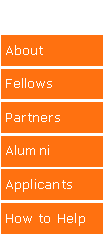


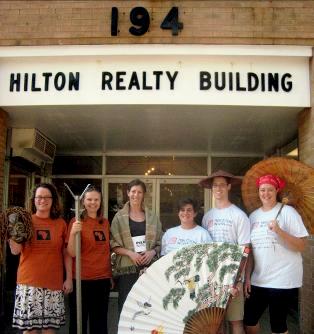
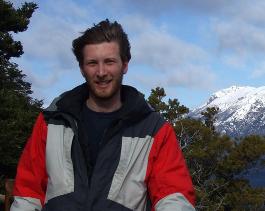
|
We Have Moved! After a number of years in the Bobst Center on Prospect Avenue, we have relocated to 194 Nassau Street, where we now share office space with Princeton in Latin America and Princeton in Asia. We’re in Suite 219; please come visit our new digs! |

|
Fellows’ Flyer |
|
September 2008 |
|
News and views for and by Princeton in Africa Fellows |
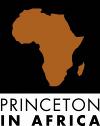
|
From left: Jasmine Clérismé ‘02, Africare, Sierra Leone • Jennifer Ruskey ‘07, Komku Trust, Botswana Thomas Dollar ‘08, Africare, Sierra Leone • Stephanie Keene ‘08, UN World Food Program, Senegal |
|
Departing For Africa This Month:
4 full-year Fellows |
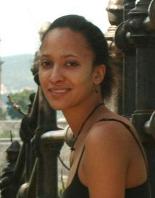
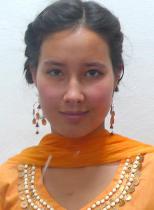
|
Sept 6 Nahal Zebarjadi |
|
Happy Birthday |
|
Annual Benefit Update
October 16, 2008 6:30 PM New York City
Tickets are on sale NOW!
3 easy ways to purchase your ticket:
· Call 609.258.7215 · Go to www.princeton.edu/piaf · Email cpersen@princeton.edu |
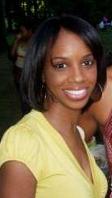
|
Sept 11 Krista Nottage |

|
Update from PiAf alumnus Lide Paterno, who continues to support students in the Tanzanian village where he worked with PiAf |
|
Reflections from summer intern |

|
Notes from the Field |
|
by Katherine Anderson, ‘08-’09 Fellow at TCRS in Tanzania |
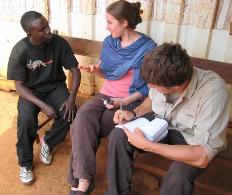
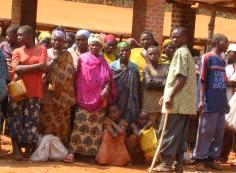
|
At some point during my second or third week here in Kibondo, I settled into a pretty comfortable routine. My alarm starts ringing a little bit after the rooster next door starts to really hit his stride, and a few minutes later the buzz of the fluorescent lights as the power comes back on in the compound works like a secondary alarm clock that’s built into the house. This means that by 6:45am each morning, I’m awake and getting ready for work while the water for the tea boils. After a quick breakfast of homemade pineapple-passion juice and either chapati (East African flat bread) or cassava, I leave my house and say hi to whichever members of my neighbor’s menagerie have migrated into my front yard. I hang a left outside my compound and follow a dirt path that winds down through a small grove of mango trees, up through someone’s yard (narrowly skirting their garbage pit), past the police compound on the crest of the hill, and back down through the field of tall grasses behind the office compound. The path doesn’t get nearly as much traffic as the main roads, but it’s also never deserted, so I still create what I think of as a mzungu-wake on my way to and from work every day: the murmurs, excited shouts, cries of “giv-a me my money!”, and laughter of the children and adults I pass—as well as the occasional tears of a scared baby—follow me wherever I go. The NGO that I work for, the Tanganyika Christian Refugee Service (TCRS), cares for vulnerable, marginalized, and displaced communities in Tanzania. Although TCRS has projects throughout the country, my placement is with the Kibondo Refugee Programme, which runs the refugee camps in the Kibondo region. And while four years at Princeton didn’t necessarily prepare me for the ins and outs of refugee camp management, all that writing and researching did groom me for my current job: translating Tanzanian English into English that UNHCR and other international NGOs and donors will recognize. My work day runs from 8am to 5pm, and aside from occasional trips to the camp, I spend most days at my desk in my office, so I try to mix things up a little bit in the evening. Granted, living 6-7 hours from the closest city means the options are pretty limited, but there are perks to living in such a remote town: I’m catching up on my reading, getting back into shape, and discovering that hopscotch is a surprisingly difficult game (especially when the boxes are drawn by a 6-year old with tiny feet!). This routine has become relatively familiar by now, but there are certain aspects of life here that I doubt will ever fade completely into the background or feel entirely normal. For instance, I don’t think that the views of the surrounding mountains or the clarity of the night sky will ever fail to take my breath away. Even more striking than the natural beauty of this area, though, is the extreme poverty of the majority of its inhabitants. Every time I visit the refugee camp, I am faced with the human effects of war and social inequality and am reminded of the long-term suffering that is a reality of daily life for the tens of thousands of refugees and internally displaced persons throughout this region. Moreover, every time I walk through town, I am reminded that fortunes of the Tanzanians living near the camp are not much better than those of the Burundians and Congolese refugees living in the camp. In fact, in certain respects—such as the prevalence of malnourishment among children—the situation of the local population is significantly worse than that of the refugees. What I find most remarkable though, is the amazing strength of spirit that seems even more pervasive than the insidious poverty. I will never grow tired of hearing the laughter that my presence always seems to provoke or of waiting for the groups of kids who come running from all over to nipe tano (“give me five” … i.e., fist bumps). I will never cease to be impressed by the unfailing generosity and hospitality demonstrated by the locals toward myself and each other. The Tanzanians and refugees living in this area really do make the most of what they have—conjuring soccer balls out of trash and twine, meals out of flour and water, and shared moments of happiness out of the foreign girl’s antics. For these (and many other) reasons, my first two months here have been memorable ones, and I’m looking forward to what the rest of the year will bring. Salama na kwa herini! Peace and goodbye! |
|
Katherine heeds the call to nipe tano |
|
Katherine translates Swahili into English for an aid worker |
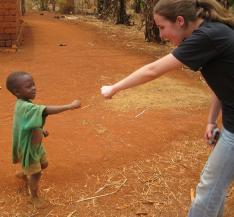
|
Refugees in the Nduta Camp await the allotments of cornmeal, vegetable oil, and beans they will receive during a food distribution |

|
by Lide Paterno ‘06 |
|
After concluding his 2006-2007 PiAf fellowship, Lide moved from Tanzania to Washington, D.C., where he works at the U.S. Department of State. He reflects here on the intersections of his fellowship experience, the NGO he recently founded to benefit Tanzanians, his current work, and his career path. Anyone who spends time in East Africa quickly becomes familiar with the ubiquitous proverbs that stretch across colorful kangas (the bright cloth wrapped around women’s waists, hanging at every market, and commonly exchanged as gifts on special occasions). One of the pithy phrases that most struck me during my time as a PiAf Fellow, and that has increasingly resonated with and guided my experience since returning to the U.S. a little over a year ago, is the Swahili adage “Dunia Duara.” Translated as “the world is a circle,” meaning all paths lead back to the same place,” the truth of this simple saying, and its apt description of my seemingly inevitable connection to the region where I first learned it, come to mind as I think about how my time in rural Tanzania has impacted where I am, and how it informs where I may be heading. The roundness (and smallness) of the world continually makes itself apparent in my current position in the Office of the Legal Adviser at the U.S. Department of State. I am reminded daily that actions occurring abroad have a very real effect on events and policies here in the United States, and vice-versa. And in no other place do I think this is truer than for the continent of Africa, and especially its future: those dusty markets where I spotted that first kanga in reality are much closer than I recognized when I initially stepped off the plane in Tanzania after graduation. In my current job, I’ve been fortunate to gain exposure to a range of issues—from diamond trafficking to public-private investment disputes, and from the African Growth and Opportunity Act to terrorist financing and state sanctions—which often bring me back to, and in which I hugely benefit from, the knowledge I gained while living and working in Tanzania. As a part of my program, I have fingers crossed to return to Africa through a rotation in a U.S. embassy, where I hope to engage in global health policy and better understand USAID health projects, as I look ahead to where one of the arcs in my world may be leading… When I became a PiAf Fellow and moved to Tanzania, I had no intention of pursuing health-related work. Yet, throughout the year I was incessantly forced to realize the pervasive extent to which health was a determinant of every other facet of development that I was partnering with the village to advance. For instance, I could pour all my efforts into arranging for a scholarship for one of my students, but if his mother were ill, or if his father has died, school attendance remained the subject of a distant dream. I could influence the structure of an industry to increase employment opportunities, but no matter how proximate we could make the market, accessibility cannot endure as more than an abstract concept to someone who cannot leave her home. I started to recognize how inextricably linked medicine is, and what a tremendous catalyst it provides, to the many other crucial areas of society that are perched to flourish in much of the developing world. I began to understand the power that medicine (and that a comprehensive approach to positive healthcare) holds to restore individuals and renew communities, to enable and embolden people just by unveiling their innate potential. When speaking with friends in my village, time and time again they stress that good healthcare is something for which they deeply yearn. Since returning to the U.S., I have continued to think about how my background in economics and public policy, my current position in foreign affairs and diplomacy, and my commitment to service and heart for human interaction all intersect with the great needs and exciting opportunities of global health. I was tremendously encouraged by Senator Bill Frist’s speech at the PiAf Annual Benefit last fall, in which he explained the special role that medicine plays in international relations through the unique access afforded to doctors (physically, in otherwise closed communities; emotionally, in patients’ and their families’ lives; and figuratively, in policy arenas), and the rare promise of peace that accompanies the loving act of medicine through service. I’ve spent this past year trying to gain exposure to the field—reading books and articles, meeting with a range of people, sitting in on some med classes (with PiAf alum Laura Schroeder!), attending a conference, shadowing a physician, and volunteering at a local hospital—to better inform my decision whether to set out for med school. I think I will dive into the post-bacc courses next spring; and although I am not exactly sure where the path may lead me (and admittedly it’s a little daunting), I’m excited for the next part of the adventure. It’s an adventure that has already brought me back to the Tanzanian village where I spent most of my post-grad year. When Carla Laroche (my fellow PiAfer) and I first traveled to the small town outside Arusha, we did not have grand plans to initiate large projects. I deeply hoped that my time there would in some way add value to the community I was working with, and I prepared myself to be impacted by the experience, but I did not anticipate the large effect that my time in East Africa would have on family and friends, and eventually strangers, who lived here in the United States. The story of our village is one that I couldn’t (and can’t) help but tell— and, as the year passed and the letters and emails poured in from the States, I realized that the hope that is intertwined through that story, and in the people who make it, is contagious across borders and over an ocean. On a few occasions these notes included money attached to instructions for me to put it to good use. “Oh no,” I thought, “I really have to be a good steward of this!” We had worked with many incredibly intelligent and impressively determined students who were finishing Standard 7, but who wouldn’t be able to attend secondary school because their families could not afford the fees, and so we arranged for several sponsorships to enable these children to continue their education. As soon as the decision was made, an immediate, heartwarming response from friends and family in the U.S. secured funding for all 13 children to begin the school year in February 2007. Since returning to the U.S. last summer, I have tried to step back a bit and evaluate whether to continue the program, and if so, how to do it in an appropriate, responsible, effective way. I’m sure we have all witnessed numerous well-intentioned programs that just missed the mark, and so I wanted to be cautious not to duplicate ongoing efforts nor to create solutions without first identifying why they are needed. However, reports from our students—that they were placing top in the class of which they had never believed they could be members—solidified my drive to stay involved in this community, even if just in a small way. Working alongside a few close friends from Princeton, we acquired nonprofit incorporation earlier this year for Tumaini Tanzania. Meaning “Hope Tanzania,” our NGO is charged with a tripartite mission: increasing access to education, comprehensively improving the quality of education, and constructing communities of corporate hope in the village of Sakila and between this village and people here in the U.S. My brother and I traveled to Sakila in March to meet with school officials, bank officials, and students and their families. We are now sponsoring 25 students at the local government secondary school, and we are working with another organization rooted in the area to plan the establishment of a new school, set to open its classrooms to the first Form 1 class in 2011. It has been such an exciting privilege to share my PiAf experience with others here in the U.S., and especially to do so by continuing to invest in the community that invested so much in me while I was there. Indeed, in just my first few years out of school, the world has seemed to become rounder and rounder. The multiple paths that I have found myself on, routes through government, global health, and non-profit work, overlap in the direction where they are heading and coincide in the place from which they come. I do not know all the points that my world’s circle will intersect, but I have a strong feeling it will continue to bring me back to the place where that kanga first revealed this simple proverb that brings me comfort and encouragement even when—especially when—I can’t see around the curve. |
|
Alum Update |
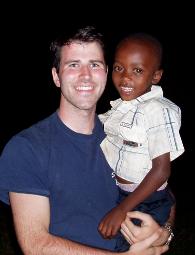
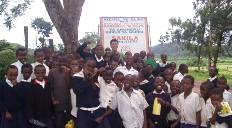
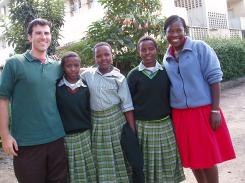
|
Lide reconnected with Obedi, his former neighbor, when he travelled back to Tanzania in March |
|
Lide and fellow PiAf alum Carla Laroche with some of the students for whom they arranged school sponsorships |
|
Sakila school students |

|
Understanding the role of African culture became quite important to me as I spent the summer in Uganda, and one particular experience comes to mind: As I walked to the bathroom on the job (which consists of one flushing and one non-flushing toilet), I noticed a new sign: “This is a European toilet. Please refrain from standing or squatting on the toilet seat.” A bit bizarre, sure, and I remember having a laugh or two, but I also realized that culture differences aren’t one-sided, and to make a point, I decided to scribble a new sign for the second stall: “This is an African toilet, please refrain from sitting on the ground.” With support from Princeton’s Pace Center and PiAf, I spent my summer in Kabale, Uganda. During my time there, I worked with a grassroots organization called Edirisa, a not-for-profit primarily focused on development projects in East Africa. The organization related to the areas of education, cultural tourism, journalism, and fair-trade crafts. I had two roles: to assist with Edirisa’s day-to-day functioning and the organization’s structure, and to better understand how to integrate development into areas while preserving traditional customs and practices. About half of my time was spent working on Edirisa’s 10-year plan and updating its governing documents, though some of my most meaningful experiences were spent in the field. Learning about the Bakiga people, undertaking drum and dance lessons, and even being taught how to shoot a bow and arrow were a few of my favorite moments that enabled me to absorb culture. How can we integrate Africa’s rich culture into current growth projects? It is a difficult balance to negotiate, at times, but Edirisa’s focus on encouraging Ugandan communities to improve upon their own crafts, skills, and customs rather than to blindly adopt others’ helped me realize how feasible integration of traditional values and modern development is. |
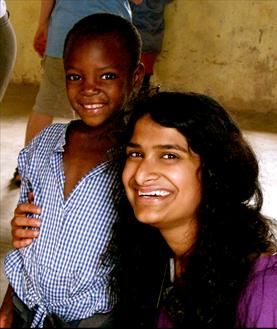
|
Summer Sojourn |
|
by Shivani Radhakrishnan ‘11, Summer Intern at Edirisa in Uganda |

